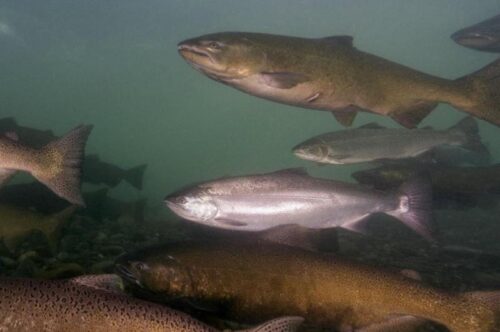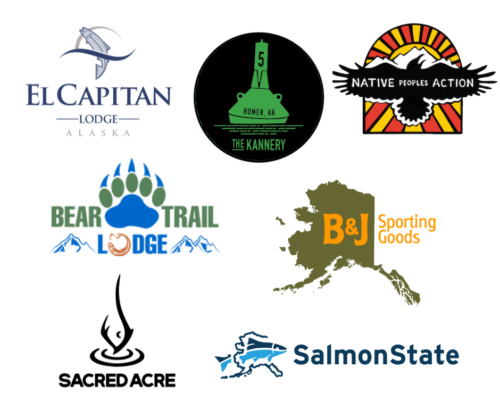
SalmonState On Trawl Season Closure: “A Wakeup Call For All Alaskans”

Late last week, news broke that a disturbing amount of bycatch Chinook salmon had been caught in the Gulf of Alaska and prompted a pending closure of the Gulf’s trawl fishery. Today, SalmonState and other Alaska fishing-related organizations put out a press release with some reaction from Alaska’s fishing and conservation leaders:
FOR IMMEDIATE RELEASE
Oct. 1, 2024
NMFS Closes Gulf of Alaska Trawl Season Early Due to Alarming Chinook Bycatch
North Pacific Council to Meet this week in Anchorage
ANCHORAGE, AK— The National Marine Fisheries Service was forced to close most of the Gulf of Alaska to pollock trawling last week after two “midwater” trawlers accidentally netted 2,000 Chinook salmon in one day bringing the estimated season total of Chinook bycatch to near or over their allowable number. While pelagic or midwater gear is supposed to be off the seafloor, recent studies found that trawl nets contact the bottom on average 40% to 80% of the time, with rates up to 100% on factory ships, also called catcher/processors. Last week’s closure halts fishing for 20 boats ahead of their scheduled Nov. 1 closure. The North Pacific Council will meet this week in Anchorage to discuss whether or not to clarify if midwater nets should be allowed to drag the bottom.
“This is a wake up call for all Alaskans,” said SalmonState’s Tim Bristol. “Thankfully the vessel that caught these salmon had electronic monitoring on board, but what would have happened if it was one of the majority of the boats fishing the Gulf of Alaska without human or electronic observer coverage?”
In recent years, only about 32 percent of boats trawling in the Gulf of Alaska have had observer coverage.
So far this year in the Gulf of Alaska and Bering Sea, observed trawl bycatch numbers stand at:
- 34,017 Chinook salmon
- 44,843 Chum salmon
- 818,476 crabs
- 3.8 million pounds of halibut
- 3 million pounds of herring

“We made the conscious decision to go ‘trawl-free’ at The Kannery in Homer this year,” said Chris Miller & Cody Fry, owners of The Green Can restaurant group. “Hearing about the ongoing situation in the Gulf of Alaska (two boats killing over 2,000 Chinook in one day) is infuriating and underscores the urgent need for change. As owners of The Kannery, a seafood-forward restaurant, we believe it’s crucial to take actionable steps to support healthier ecosystems and safeguard our marine life for future generations.”
“We cannot allow bycatch like this to continue destroying key species and entire ecosystems,” said Hannah Stearns, Assistant Director of Sacred Acre. “The Gulf of Alaska’s King salmon are a vital part of our environment, culture, and economy, and the industrial trawling that endangers them needs to be stopped. This is why Sacred Acre stands firm in its mission to expose and combat factory trawling and bottom trawling, which threaten the balance of life in our oceans.”
“As Alaska’s largest dedicated fishing tackle and bait shop, we’ve become an unofficial conversation hub on the subject of trawling and the state of our fisheries across Alaska. We regularly hear firsthand accounts of frustration, astonishment, and expressions of dismay over our deeply alarming and rapidly declining crab and salmon populations. The overwhelming consensus being, ‘Something must be done about trawlers,’ said Troy Arnold, Owner of B&J Sporting Goods. “While it should never have had to come to this level of crisis, it is good that the National Marine Fisheries Service is finally recognizing these boundaries and the value of salmon to Alaskans, and asking the trawl fleet to stand down as thousands of us Alaskans have had to do in the name of salmon conservation in recent years.” Read the full statement.
“In a time when local Alaska fisheries (commercial & sport) are trying to survive on continuously decreasing allowable catch limits of salmon and halibut it is well overdue that the largest destroyer of Alaska’s finest seafood species is held accountable,” said Scott Van Valin, Owner/ Operator of El Capitan Lodge. “There is no getting around the fact that the substantial bycatch levels of salmon, halibut, and crab by the trawl fleet is unsustainable to the resource and comes at the expense of every other user group that participates in Alaska fisheries. It’s time for significant change.”
“Federal trawl fisheries catching Chinook in Alaska’s waters have had a detrimental impact on our communities and the families that rely upon a healthy ecosystem to practice a way of life that remains central to who we are as Indigenous Peoples. The inequities in policy that allow bycatch of Chinook in Alaska waters while Tribes have limited or no access is unacceptable,” said Craig Chythlook, Fisheries Policy Director for Native Peoples Action. “A recognition and return to Tribal stewardship and governance are essential to honor our relationships with the species that have experienced a significant decline in the decades since commercial trawling began in our ocean waters.”



